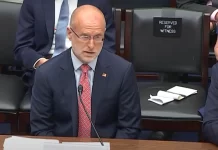Disney is going to lose (again) to Florida and Ron DeSantis on the special treatment the Reedy Creek Improvement District receives.
by Josh Hammer
The first round of the “Florida and Gov. Ron DeSantis v. The Walt Disney Company” fight, held last spring, ended in a clear DeSantis victory and Disney defeat. Following Disney’s vocal opposition to Florida’s commonsense Parental Rights in Education Act, misleadingly dubbed the “Don’t Say Gay” bill, Florida passed a law to abolish the Reedy Creek Improvement District, which in 1967 incentivized Disney’s initial planting of a flag in Central Florida by giving the corporation unparalleled government-like powers over basic municipal services such as zoning, building codes and waste treatment.
Disney thus paid the price for coming out in favor of indoctrinating impressionable kindergarteners in vogue gender ideology and queer theory by having its gratuitous, extra-legal corporate welfare rescinded, putting it on an equal playing field with every other corporation operating in the state of Florida.
Not content to merely get smacked around once, apparently, Disney under former and since-reinstated CEO Bob Iger has opted to attempt a not-so-clever end-around that would thwart the will of Floridians, as represented by the Florida Legislature, and entrench Disney’s peculiar legal arrangement in Central Florida for another 30 years. Try as Disney might, the forthcoming result will be a familiar one: Florida and DeSantis are going to win again, and Disney is going to lose again.
On Feb. 10, Florida passed HB 9B, which formally superseded the Disney-dominated Reedy Creek Improvement District with the Central Florida Tourism Oversight District. The practical effect was to replace the old board’s five Disney-controlled members with the new board’s five DeSantis-appointed members. The new board went into effect on Feb. 27.
So far, so good.
But, as it turns out, the outgoing Reedy Creek Improvement District board, in the final lead-up to HB 9B’s passage into law, purported to enter into a binding development agreement with Disney. The purported contract would (SET ITAL) explicitly (END ITAL) give full control over zoning, building development rights and other areas to Disney for another 30 years — thus going even further than the already favorable treatment Disney enjoyed under the Reedy Creek Improvement District, and stripping the new Central Florida Tourism Oversight District of any meaningful regulatory teeth. In a comically self-serving move, the development agreement even mandates — surprise! — that the new district spend property tax revenue on roads to benefit Disney pet projects.
There is just one glaring problem with the purported development agreement between the outgoing Reedy Creek Improvement District board and The Walt Disney Company: It is a blatantly illegal contract. The purported development agreement flouted the normal procedural mechanisms that regulate such governmental activity in Florida, and also violated some of the most rudimentary principles of contract law that every first-year law student in America learns in contracts class.
First, as a purported contract, the development agreement between Disney and the outgoing board requires “consideration” by both contracting parties; in other words, each side would need to make some sort of promise, or vow some sort of specific action, with respect to the counterparty. This purported development agreement, which was rushed through last-minute in ham-fisted fashion, lacks consideration, perhaps the most basic element in all of contract law: Here, the outgoing board purported to give Disney (SET ITAL) everything, (END ITAL) but it received (SET ITAL) nothing (END ITAL) in return. Absent consideration, the purported development agreement was void ab initio.
Second, under Florida’s well-known, powerful Sunshine Law, a local government must comply with certain notice requirements for residents in order for the matters addressed at a government’s board meeting to be valid and binding. Public notice of a meeting is mandatory under Florida law; and specifically, for an action of this sort to be binding, notice of the underlying meeting must be mailed to local property owners. Disney and the outgoing board simply did not do that; they rushed their first public board meeting on the development agreement on January 25, and their second meeting on February 8, in their sloppy attempt to thwart at the last minute the Florida Legislature and the will of the Florida people. Unfortunately for Disney, Florida courts have consistently held that when the Sunshine Law is violated, a purported governmental action is void ab initio.
Third, the Florida Constitution specifically stipulates that new revenue-raising measured based on ad valorem (i.e., proportional) taxation, which the purported development agreement entailed, can only be ratified via a direct referendum of a district. That condition was also not met here; rather, in another comically self-dealing move for Disney, the purported development agreement contained a provision that the district “shall fund” certain Disney prerogatives. This too is blatantly illegal.
Finally, the purported development agreement violates yet another basic tenet of contract law: that a contract not be procedurally or substantively “unconscionable.” In fact, the purported development agreement is (SET ITAL) both. (END ITAL)
It is procedurally unconscionable because the very nature of (SET ITAL) private (END ITAL) Disney lawyers “negotiating” with the Reedy Creek Improvement District’s outside counsel and drafting statements for a (SET ITAL) public (END ITAL) hearing is blatantly self-dealing conduct; one source with close knowledge tells me that Disney’s lawyer, in the lead-up to the outgoing board’s two hearings, candidly confessed that the “optics look bad” for his name to be on the contract as the drafter, suggesting instead that the outgoing district’s counsel have his name listed notwithstanding the obvious falsity. And the purported development agreement is substantively unconscionable because the entire purpose of this charade is to evade the will of the people of Florida, whose duly elected representatives wanted to replace the Disney-dominated Reedy Creek Improvement District board with the DeSantis-selected Central Florida Tourism Oversight District board.
Earlier this week, Gov. DeSantis announced that the Republican-dominated Florida Legislature, which is now nearing the end of its legislative session, would look to formally override and nullify the purported development agreement. That is certainly proper, and such action is well within the legitimate ambit of the Florida Legislature’s authority. But it is important to also recognize that Disney’s farcical attempt to avoid its well-deserved fate was, and remains, blatantly illegal on its face.
One way or another, Mickey Mouse the groomer is going to lose again to Ron DeSantis and the free state of Florida.
To find out more about Josh Hammer and read features by other Creators Syndicate writers and cartoonists, visit the Creators Syndicate website at www.creators.com.
COPYRIGHT 2023 CREATORS.COM
For more Rights, Justice, and Culture News.
For more from The Heartland Institute.










